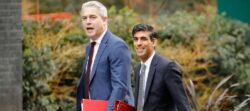Rishi Sunak has warned Britain that its Covid-19 economic emergency has only just begun after responding to news of the deepest slump in more than 300 years by pledging a fresh £55bn to tackle the pandemic.
On the day that the daily death toll from the virus reached a new second-wave peak of 696, the chancellor said that despite borrowing a peacetime record of £394bn this year, he would need to carry on spending in order to protect lives and livelihoods.
The “economic emergency” caused by Covid-19 has only just begun, according to chancellor Rishi Sunak, as he warned the pandemic would deal lasting damage to growth and jobs.
Official forecasts now predict the biggest economic decline in 300 years.
The UK economy is expected to shrink by 11.3% this year and not return to its pre-crisis size until the end of 2022.
Government borrowing will rise to its highest outside of wartime to deal with the economic impact.
The government’s independent forecaster, the Office for Budget Responsibility (OBR) expects the number of unemployed people to surge to 2.6 million by the middle of next year.
It means the unemployment rate will hit 7.5%, its highest level since the financial crisis in 2009.
However, fewer jobs are expected to be lost than predicted this summer.
The National Minimum Wage
The minimum wage – which has been rebranded as the National Living Wage – will increase by 2.2% – or 19p – to £8.91 an hour, with the rate extended to those aged 23 and over.
Other rates were also increased. From next April, 16 and 17 year-olds will see their pay go up to £4.62 per hour, from £4.55 today.
The UK also ditched its policy of spending 0.7% of national income on overseas aid to help deal with the coronavirus crisis at home.
Mr Sunak said the new 0.5% target – which adds up to about £4bn in savings – will be “temporary”.
And millions of retirees will see the future value of their pension cut owing to a planned change in the way payments are calculated from 2030.
Public Sector Wages
The chancellor confirmed that around 1.3 million public sector workers – excluding some NHS staff and those earning less than £24,000 – will have their pay frozen next year.
The chancellor said he could not justify an across-the-board increase when many in the private sector had seen their pay and hours cut in the crisis.
But Mr Sunak said lower-paid public sector workers would be guaranteed at least a £250 pay rise next year.
Mr Sunak said the government had already spent £280bn to help support the economy through the coronavirus.
It will spend a further £55bn next year as part of a package of measures to support the recovery. This includes billions of pounds to help people find jobs.
…………………………………..





